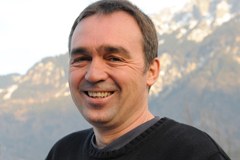News
Time to shelve the growth model
Jul 08, 2010
Yearly Symposium 2009 Gamprin/FL “Growth come hell or high water?”. Andreas Götz, Director OF CIPRA International, on declining growth and its repercussions for the Alps.
CIPRA is calling for ideas on satisfaction, subsistence and happiness. What does that mean for the Alps?
Andreas Götz: There are clear limitations to the simplistic formula of wanting to achieve prosperity and quality of life through economic growth. Everyone understands that nature cannot grow indefinitely. The same is true of the economy; after all, it too thrives on natural resources and they are also limited. As sensitive ecosystems the Alps are particularly affected by ecological change – with serious repercussions on their economy and their social and cultural life.
CIPRA sees the Alps as a profiteer and a victim of growth. What needs to be rectified?
Our economy is based almost entirely on oil. But there is going to be less and less of that in future; in fact the amounts extracted annually will peak in a few years’ time. The financial and economic crisis has accentuated the urgency for a new way of thinking and acting. There is no future, economically or ecologically, in going back to the old ways and simply doing more of the same. It is not enough simply to tweak the growth model previously used. What we need is a fundamental reorientation; it is crucial that growth in the West’s industrial nations be reined in. And the Alps have to do their bit.
At its Yearly Symposium in Gamprin/FL, CIPRA formulated ten theses. What is it hoping for?
This catalogue is designed to raise people’s awareness of issues such as growth, its finite nature, and potential contraction scenarios. It is intended to highlight potential areas of action for the Alps such as climate policy, regional economic cycles, spatial planning and mobility, and show that limited growth is also an opportunity. For science and the economy, the issue of contraction is no longer an unknown concept. But it still is for politics. CIPRA is calling on people to address this contraction process head on. The Yearly Symposium has shown that there are no simple formulas; instead there are many possibilities for preserving the quality of life in the Alps even within a scenario of declining growth – in fact that quality of life might even improve.
What is CIPRA’s role in all of this?
CIPRA is not afraid of tackling difficult issues. It processes the findings of science and research and makes them available to a broader audience. And so it contributes substantially to the decision-making process and helps to plot the right course so that even in fifty years’ time life in the Alps will still be well worth living.
Source: Annual Report 2009 CIPRA International
www.cipra.org/en/CIPRA/cipra-international
Andreas Götz: There are clear limitations to the simplistic formula of wanting to achieve prosperity and quality of life through economic growth. Everyone understands that nature cannot grow indefinitely. The same is true of the economy; after all, it too thrives on natural resources and they are also limited. As sensitive ecosystems the Alps are particularly affected by ecological change – with serious repercussions on their economy and their social and cultural life.
CIPRA sees the Alps as a profiteer and a victim of growth. What needs to be rectified?
Our economy is based almost entirely on oil. But there is going to be less and less of that in future; in fact the amounts extracted annually will peak in a few years’ time. The financial and economic crisis has accentuated the urgency for a new way of thinking and acting. There is no future, economically or ecologically, in going back to the old ways and simply doing more of the same. It is not enough simply to tweak the growth model previously used. What we need is a fundamental reorientation; it is crucial that growth in the West’s industrial nations be reined in. And the Alps have to do their bit.
At its Yearly Symposium in Gamprin/FL, CIPRA formulated ten theses. What is it hoping for?
This catalogue is designed to raise people’s awareness of issues such as growth, its finite nature, and potential contraction scenarios. It is intended to highlight potential areas of action for the Alps such as climate policy, regional economic cycles, spatial planning and mobility, and show that limited growth is also an opportunity. For science and the economy, the issue of contraction is no longer an unknown concept. But it still is for politics. CIPRA is calling on people to address this contraction process head on. The Yearly Symposium has shown that there are no simple formulas; instead there are many possibilities for preserving the quality of life in the Alps even within a scenario of declining growth – in fact that quality of life might even improve.
What is CIPRA’s role in all of this?
CIPRA is not afraid of tackling difficult issues. It processes the findings of science and research and makes them available to a broader audience. And so it contributes substantially to the decision-making process and helps to plot the right course so that even in fifty years’ time life in the Alps will still be well worth living.
Source: Annual Report 2009 CIPRA International
www.cipra.org/en/CIPRA/cipra-international


